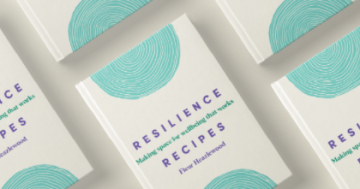Michelle Gibbings* says the COVID-19 era has left many people tired and burnt out — so there has never been a better time to prioritise self-care.
 The year is well under way, and for many of us, there is an emotional hangover.
The year is well under way, and for many of us, there is an emotional hangover.
Two years of COVID-19-induced uncertainty and lockdowns have left us feeling tired and drained.
The summer holidays didn’t leave us feeling recharged and the Easter long weekend went way too quickly.
At the same time, the pace of the working year is racing ahead.
If that’s you, now is an excellent time to check your foundations so you can make the most of the rest of 2022.
You don’t have to look too far to see the statistics or hear stories that illustrate the strain the last two years have thrown our way.
Yet, the rise of burnout at work didn’t start with the pandemic. It’s been climbing for years.
For example, a 2018 Gallup study found that of the 7,500 full-time employees surveyed, 23 per cent felt burned out at work very often or permanently, and an additional 44 per cent felt burned out sometimes.
The rise of burnout resulted in the World Health Organisation officially classifying it as a recognised illness in May 2019.
Therefore, knowing the warning signs and putting in place practices to prevent it from taking hold is critical — not just for you but so you can be ready to support your team members and colleagues.
Step one – start noticing
Firstly, be alert to the warning signs of burnout.
The symptoms can include: Feeling ineffective and more negative, having reduced energy, motivation and efficiency, and being more frustrated and irritable.
You may feel as though you are working hard and accomplishing less.
At this point, you may also find yourself drinking too much, eating poorly, and relying on substances and other unhealthy mechanisms.
These practices will only exacerbate the problem.
Step two – recognise the emotional load
The last couple of years have been challenging on many fronts.
It’s essential to recognise the emotional load that you may be carrying, because acknowledging and accepting how you feel is a crucial part of this.
You will also want to manage your energy and give yourself more time than usual to rest, reflect and recharge.
Actively and deliberately build this time into your day.
One way to do this is to shift your environment. For example, allocate time where you get outside and away from your desk.
When you do this you alter your state, which helps reset your mindset and enables you to get a fresh perspective.
Step three – take deliberate action
Get deliberate about the choices you are making about your day.
Are you making healthy and wise choices, or are you making the easy choices?
Consider the steps you can take to find more control in your day.
For example, everyone likes to see they are making progress; we find it motivating.
In contrast, a lack of progress and constant setbacks is demotivating.
Consequently, find ways to break your work into smaller, more bite-sized pieces so it is easier to see more regular progress.
Step four – say no more often
Be upfront with your boss about your workload and what’s manageable.
It can be effortless to say ‘yes’ when a request comes in, yet there will be times when you need to say ‘no’.
It helps to set realistic boundaries about what you will and won’t do and how you will respond to requests for work outside standard working hours.
Step five – build healthy habits
Build regular routines that are healthy and support your emotional and physical state.
This can include exercise that releases the brain’s happy chemicals or getting enough sleep, eating well and meditating.
It can be as simple as watching a dog run around the park, or breathing deeply.
Step six – stay connected
Tom Rath, in his book Vital Friends: The People You Can’t Afford to Live Without, outlines research that shows employees who have best friends at work are seven times more likely to be engaged in their jobs.
Additionally, if they have at least three vital friends at work, they are 96 per cent more likely to be satisfied with their lives.
Connection is at the root of all human existence. When you have relationships at work, you have trusted friends to talk through your challenges and get advice.
When you have strong connections with friends and family, you have people to share with.
Opening up and sharing how you feel and being open about experiences is healthy and good for the soul.
In today’s busy, busy world, taking care of yourself isn’t a luxury; it’s essential.
Having that in place gives you the bandwidth to better respond to what’s happening around you.
As author, Charles Swindoll once said: “Life is 10 per cent what happens to me and 90 per cent of how I react to it.”
*Michelle Gibbings is a Melbourne-based change leadership and career expert and founder of Change Meridian. She can be contacted at [email protected].
This article first appeared atwww.changemeridian.com.au.











